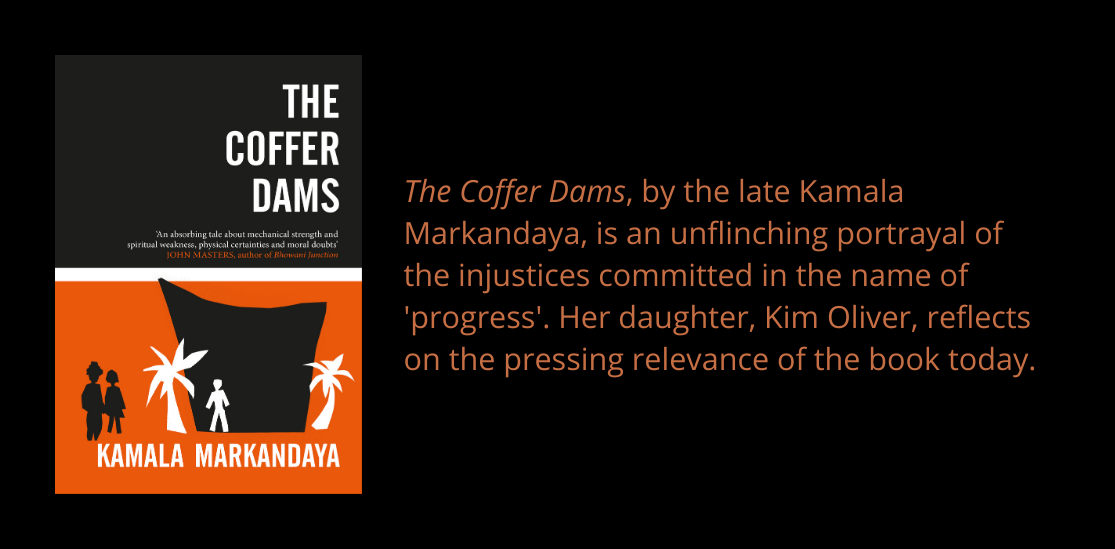I’m very much looking forward to the re-publication of
The Coffer Dams by my mother, Kamala Markandaya. This novel with an ecological and holistic theme, written more than fifty years ago, seems so topical today.
My mother said that she had to be angry about something before she could write about it. I’m proud that she wrote about injustice towards the colonised; the poor; the disadvantaged and weak; the homeless, the old, the sick; minorities with dark skin; indigenous people dispossessed of their lands; women, children, and animals. Today, aided by social media, many people are rising up against various faces of oppression (#BlackLivesMatter; #MeToo; #CatholicSexAbuse). Fifty years ago Kamala Markandaya was giving a voice to the oppressed in her writing; today her anger still rings true.
In The Coffer Dams a British-led, Indian government-appointed joint venture is building a dam on a turbulent river in the hills of south India. Clinton, founder and head of the British company, is a visionary engineer, and the dam is his dream – a shining concrete and steel structure that is the future. Clinton’s whole way of life is a power struggle – politically, to win the tender; in engineering terms, to get his way over the construction; with his British colleagues and Indian workers. His decisions often overrule those of his Indian colleagues, to their bitter fury. It is two decades since India ceased to be a British colony, but the injustice of the country’s occupation by a foreign power is still very much felt. Yet he and they are working towards a common end.
Helen, Clinton’s young wife, finds some broken pottery near her house, and on asking her husband about it, she finds that an indigenous hill tribe previously lived there. They had to move away, not just from the area where the dam is being constructed, but also from the spot where Helen’s new bungalow has been built. “Was this fair?” wonders Helen. “They just left,” says Clinton who has no concern for the hill tribe. But Helen sees them as people. Clinton gets an intimation of danger – the way Helen thinks is different to his way of thinking…
The tribal people, whom Helen befriends, understand the natural environment in a way that the engineers, for all their technical knowledge, do not – apart from Bashiam, the brilliant crane operator who is from the tribe and has a dual vision, sharing the tribe’s knowledge of the environment which is their inheritance, and also Clinton’s passion for state-of-the-art man-made structures and machinery.
A schedule for the building of the dam has been drawn up by the engineers and statisticians. The tribesmen, however, say that not enough allowance has been made for the monsoon rains. Others say that the river is a demon…
The power struggle that ensues has many faces. The engineers pit themselves and their science and technology against nature - river, jungle and monsoon rains. Krishnan, head of Indian labour, struggles against Clinton for domination over the men. Helen tries to get Clinton to see the threatened tribe as people rather than just a labour pool. She is drawn to Bashiam, and Clinton is forced to see the “jungle johnnie” as a man, a sexual adversary, instead of a worker of no interest. And now the power struggle is within the Clintons’ marriage.
Racism manifests itself at every level: from Clinton with his conviction that his view must prevail, to the British workmen whose racist attitudes to the Indian labourers are crudely expressed. Bashiam is trebly an outsider – looked down on by the British, by the Indians (as he is a tribesman, a “jungly wallah”) and by the tribesmen too as he has left the tribe to become a modern-world engineer.
In 2020, we are conscious that factors such as human encroachment on natural habitats may impact on us in ways we did not expect. Climate change is impacting on all of us and humans’ destruction of animals’ habitats forces them to live under stress, which causes viruses and other illness, to which we are vulnerable if we live too closely with them… Kamala Markandaya may not have foreseen the current pandemic, but she certainly did see the viciousness of exploiting a natural area and a powerless indigenous population, without regard to the rights of either. And she predicted that it would not be without consequences to the perpetrators.
Tribal people, the aboriginal population of India, have maintained their way of life oblivious to whether Mughals, the British, maharajahs or Indians were in power. Many traditionally lived off the forest. They are of course challenged by encroachments on their territory and threats from modernisation and westernisation. They live outside the mainstream of Indian Hindu and Muslim society, and many ordinary Indians know little about them. Yet they make up 8.6% of India’s population – 104 million people in 2011.
While Kamala Markandaya did not specifically focus in this novel on the injustice of the treatment of tribal people, it is there on every page. My mother sometimes spoke of the Nilgiri Hills, the southern Indian uplands very familiar to her. I don’t remember hearing her speak of the Toda people, but they are the tribal people of that area, so presumably she knew about them.
Kamala Markandaya turns a searchlight onto the consequences of Clinton’s exploitation of river and forest, regardless of the inhabitants. But the book is a novel, not a treatise. The subtly written narrative of water, jungle and tribal settlement, versus dam, engineering and industrial construction, is intertwined with the lives of the characters, who are profoundly affected by the natural environment. Clinton and Helen discover unsuspected truths about their marriage – and themselves.
Kim Oliver
2020
